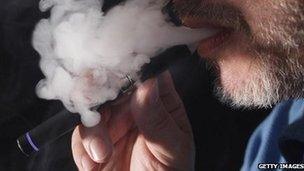E-cigarettes face new restrictions
- Published

Electronic cigarettes will be licensed as a medicine in the UK from 2016, under new regulations.
The UK currently has few restrictions on the use of e-cigarettes, despite moves in some countries to ban them.
The Medicines and Healthcare Products Regulatory Agency says it will regulate e-cigarettes as medicines when new European tobacco laws come into force.
Sales of tobacco-free cigarettes have boomed worldwide since bans on smoking in public places were introduced.
Campaigners say the growing popularity of e-cigarettes could undermine years of anti-smoking efforts, with particular concerns about promotion to children and non-smokers.
Research suggests around 1.3m smokers and ex-smokers in the UK use the products, which are designed to replicate smoking behaviour without the use of tobacco.
They turn nicotine and other chemicals into a vapour that is inhaled.
Jeremy Mean of The Medicines and Healthcare Products Regulatory Agency (MHRA) said the government had concluded that e-cigarettes currently on the market do not meet appropriate standards of safety, quality and efficacy.
He said "levels of contamination" had been found in the products and some were poorly manufactured.
Not recommended
There will be no compulsory licensing of the products until 2016 but until then they are not recommended for use, he said.
"We can't recommend these products because their safety and quality is not assured, and so we will recommend that people don't use them," he told a news conference.
The MHRA had decided not to ban the products entirely but to work towards a position where they are licensed, he added.
"Smoking is the riskiest thing you can do - we want to enable people to cut down and quit - we don't think a ban is a proportionate action."
The health campaign body, Action on Smoking and Health (ASH), said the action will ensure promotion to children or non-smokers is prohibited.
Deborah Arnott, chief executive of ASH, said: "MHRA regulation can ensure that adult smokers can continue to be able to buy e-cigarettes as easily as tobacco, but promotion to children or non-smokers will be prohibited."
Chief Medical Officer Professor Dame Sally Davies said with more people using e-cigarettes it was only right that the products were properly regulated to be safe and work effectively.
"Smokers are harmed by the deadly tar and toxins in tobacco smoke, not the nicotine," she said.
"While it's best to quit completely, I realise that not every smoker can and it is much better to get nicotine from safer sources such as nicotine replacement therapy."
Manufacturers of e-cigarettes say the products have the potential to save lives and should not be restricted.
Adrian Everrett, chief executive officer of E-Lites, told the BBC: "So far not one person globally has been killed by an electronic cigarette and yet every 5 minutes in this country alone someone dies from tobacco use.
"To remove or restrict the use or availability of the electronic cigarette from this market would be a significant health loss."
Once licensed, e-cigarettes are expected to remain on sale over-the-counter in the UK.
In some countries, such as New Zealand, e-cigarettes are regulated as medicines and can be purchased only in pharmacies.
In other countries, including Denmark, Canada and Australia, they are subject to restrictions on sale, import and marketing. Complete bans are in place in Brazil, Norway and Singapore.
Dr Mike Knapton, Associate Medical Director at the British Heart Foundation, said more research was needed into the potential health implications of long-term nicotine use.
"The MHRA has rightly addressed the worrying dearth of regulation around nicotine-containing products and electronic cigarettes - an important step to ensuring their safety," he said.
"Marketing of these products must now be closely monitored to ensure non-smokers and children don't end up using them."
- Published11 February 2013
- Published6 December 2012
- Published6 July 2012